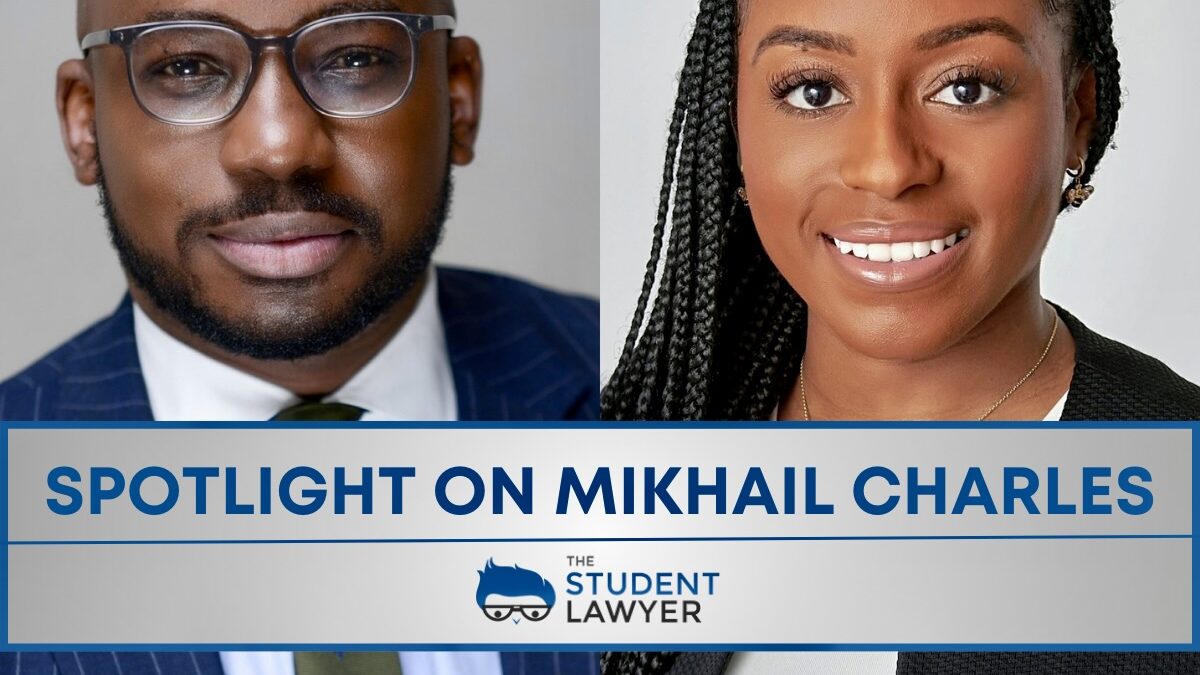
Potanina (Respondent) v Potanin (Appellant) [2024] UKSC 3
March 29, 2024
Global Voices: Diversity in Law for International Students
March 30, 2024By Christianah Omobosola Babajide.
Reading time: seven minutes
COB: Welcome to today’s interview with Mikhail Charles, a barrister whose journey from Saint Vincent and the Grenadines to Britain has been nothing short of remarkable. Mikhail, thank you for joining us today.
MC: Thank you for having me Christianah.
COB: Please start off by telling us a little bit about your background.
MC: I was born and grew up in Saint Vincent and the Grenadines. I attended the Kingstown Preparatory School (primary), then the Saint Vincent Boys Grammar School (secondary) before going on to do my A-Levels in Saint Vincent.
Following a series of almost existential teenage and young adult crisis’, I toyed with being a commercial banker (my first ‘real’ job was at the National Bank of Saint Vincent and the Grenadines where I was a teller), diplomat and real estate valuator before settling on being a barrister after doing jury duty and seeing the prosecutor absolutely nail a crook to the proverbial cross.
Considering my upbringing, it was a pretty standard conservative West Indian upbringing – with an emphasis on faith, sport, academics and discipline as a whole. With respect to my family background, my parents were serving diplomats (at the time) and one was a former MP, I was able to come to Britain for university for my undergrad and vocational training and live for a time with them.
I grew up in a nuclear family however I am very close with my maternal Grandmother to whom I attribute some of my character traits to as she played a part in raising me – I make it a point to spend her birthday with her each year.
COB: Can you tell us about your journey to the Bar so far?
MC: After completing my A-Levels in Saint Vincent at the St. Vincent Community College, I did the University of Wales, Cardiff LL.B (Hons) [2008-2011] while working various jobs inclusive of at a startup called ‘Graze’ which at the time delivered fruit through the Post, doing door security at various pubs in Wales and London, close protection at various night clubs and picking up litter in West London (international student fees and the strength of the Pound Sterling in those days were something else!).
I then did the Bar Professional Training Course at City University Law School in London. After being called to the Bar in England & Wales (2012), I then worked for a while in a tax and business consultancy accounting firm in Kingston, Surrey (great memories and great exposure).
I returned to the Caribbean (after not obtaining pupillage in England) and was admitted in several jurisdictions there, including Saint Vincent and the Grenadines (2013), Grenada (2015), Saint Lucia (2015), the British Virgin Islands (2018) and Saint Kitts and Nevis (2019).
I later did a Masters in Corporate and Insolvency Law at Nottingham Law School (2015 – 2017) while working as a Legal Officer for the Commonwealth Secretariat, headquartered in London at Marlborough House.
Along the way I have been fortunate to have had some great legal experiences inclusive of working ‘in-house’ at the Telecommunications Authority for the Eastern Caribbean in Saint Lucia, and then joining a boutique offshore litigation firm headquartered in the Turks and Caicos before taking a year off before getting pupillage.
COB: What inspired you to become a barrister?
MC: I like finding solutions and a good argument, I also am a very solitary creature that doesn’t fit well into a traditional employment mould (I despise a 9-5 regime), in essence, I tend to be very self-reliant, self-sufficient and I like positive conflict. I also saw the law as an important tool for achieving justice and wanted to be part of that process.
COB: Can you share with us how your dual practice as a barrister in the UK and Grenada has shaped your legal career?
MC: To correct you, I am admitted in 5 (so far!) countries in the Eastern Caribbean. I have actively practiced for over 10 years in Saint Vincent and the Grenadines where I was first admitted in 2013.
Working in other jurisdictions has given me a uniquely maybe a truly common law perspective, indeed the rule of thumb for former British colonies is that we practice English common law, save where modified by our written constitution and local black letter law, that helps somewhat save that here in England there is so much printed material that can impact a case it can get overwhelming to try to get to the root of a legal issue.
Many of my Caribbean cases involve cross-border elements, offshore structures, or enforcement of judgments across jurisdictions. So far, I have not been able to replicate that here in London as I am at the very junior end of things but I have been fortunate to have been instructed on a few matters where I can leverage my overseas experiences, lets see what happens next!
COB: What motivated you to pursue a legal career in both the UK and Caribbean, and how do you strike a balance?
MC: If members of the English bar can do it, why can’t I? That was my thought in my year off from practice in 2021 and I followed through on that.
Most Commonwealth Caribbean Courts are accustomed to seeing the ‘traditional’ English barrister trammel in and out of local Courts and the Privy Council, and not an eye is batted.
I always thought why not a reverse osmosis – we all read the same books, wear the same robe, collar, bands etc.why can’t I similarly fly into London and do cases and be regarded as competent? It’s a no-brainer in my view.
I was motivated to qualify and practice in the UK in order to gain experience in a large commercial center and broaden my skill set.
To be frank I come from a country that is 100 thousand in population, that’s less than my neighbourhood of Acton West London, versus England and Wales which is 60 million in population or more – to me it is a no brainer where I need to be to have greater volume of work in one or more particular practice areas.
Yet the Caribbean is my home however, and I care deeply about contributing to the development of the legal sector there.
Balancing my practice across all jurisdictions takesbusiness development, organization and discipline.
Modern technology makes it much easier than it once was. I’m able to serve clients (delivering advice, legal opinions, memos, other types of drafting work), appear in court (except for trials), deliver lectures, and collaborate with colleagues seamlessly from different locations.
Careful diary management, as with anything, is key.
COB: Can you share any experiences where your dual jurisdictional expertise played a significant role in achieving a favourable outcome for your clients?
MC: One that comes to mind is a case where I acted (while working for a boutique offshore firm and led by, incidentally an English barrister) for a Texan judgment creditor pursuing a US$40m judgment debt against a Trinidadian company’s subsidiary in BVI.
It involved complex cross-border insolvency and enforcement issues. My understanding of both US and Caribbean legal systems, as well as my BVI bar admission, enabled me to effectively coordinate between the various jurisdictions and devise an enforcement strategy that protected the client’s interests.
(Bonus) A current active case, I am currently chasing a recalcitrant offshore bank and its errant CEO who owe my client tens of millions of dollars and pounds sterling(which are the clients’ deposits), thankfully we have judgment against both bad actors just no money yet. Chasing these assets across borders against the back drop of the local political system and its adherents, the international banking system and local laws has been a strenuous but rewarding battle, the war continues but I am fairly confident that my client will be successful.
COB: Could you tell us about some of the challenges you face when dealing with proceedings in other jurisdictions?
MC: Navigating nuanced differences in legal systems (for example, Saint Lucia is a hybrid system between English Common Law and a French Civil Code, Saint Vincent and Grenada ‘s land law is entirely unregistered – so think pre – 1925 English land law), procedures and business cultures is a frequent challenge that requires sensitivity and adaptability particularly as many Caribbean jurisdictions do not have their legislation online, nor case law freely available online, researching the position on a matter is usually the greatest challenge.
Dealing with different time zones can also add logistical complexity, especially when urgent relief is sought as well as the difference in culture in respect of time and its concomitant relevance to urgency.
Tracing assets and unwinding elaborate corporate structures across borders also tends to be difficult and time-consuming.
Certain jurisdictions may have blocking statutes or be unwilling to provide judicial assistance, adding further obstacles.
Persistence, creativity and strong local counsel relationships are essential.
Quick fire questions…
COB: Last concert you went to?
MC: I believe it was either ‘Vibes with Voicey’ featuring Voice (Trinidad Soca Artiste) and Skinny Fabulous (Vincentian Soca Artiste) for Nottinghill Carnival 2023.
COB: Favourite dancehall artist?
MC: Of course Vybz Kartel as foundation but right now it’s ‘Masicka’, ‘Shane-O’, ‘Teejay’ and ‘Popcaan’.
COB: Tell us one thing people don’t know about you.
MC: Despite my martial arts background, I’m actually quite clumsy! I’ve been known to trip over thin air and (bonus) I am a classically trained flautist.
COB: Thank you once again for joining us today, Mikhail. It’s been a pleasure speaking with you. You can connect with Mikhail via LinkedIn.





